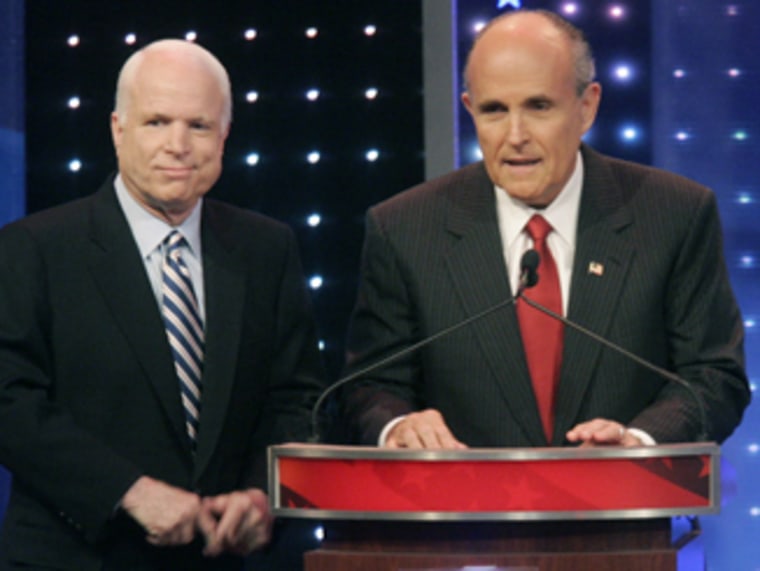The constant complaint I hear traveling around the country is that the 2008 presidential campaign started too early and is lasting too long, two propositions that are difficult to argue with.
Citizens might find solace in the notion that increased fundraising demands on candidates will force them to ramp up early. In addition, once the nominations are settled -- most likely in the first half of February -- there will probably be a month or two of intermission or halftime. By this time, both winning campaigns should be flat broke and the candidates and operatives alike will likely be on the verge of a physical, if not emotional, breakdown.
While the most common analogy that presidential campaigns have become marathons is certainly accurate, another appropriate comparison might be to say that they have become political soap operas. Consider where we are today in terms of the Republican nomination.
Can Sen. John McCain, R-Ariz., the initial GOP front-runner, raise enough money by the time the second-quarter campaign finance books close on June 30 to survive and continue on? While his candidacy might not be dead, it is, at best, on life support at this point.
An interesting question is whether McCain was worse off with immigration reform failing in the Senate or with it passing. Whatever the case, just the debate itself was further damage to McCain's already diminished prospects.
Can former New York City Mayor Rudy Giuliani, who supplanted McCain as the leading GOP contender in many national polls, hang on to his front-runner position? It took awhile for Giuliani's positions on social and cultural issues to begin weighing down his candidacy -- longer than many of us thought it would -- but that has clearly begun to happen.
While former Massachusetts Gov. Mitt Romney's surge in fundraising and in nationwide and Iowa caucus polls helped trigger the announcements last week by Giuliani and McCain that they would not compete in the August Iowa Republican straw poll, Romney, too, has his challenges.
In making his conversion on social and cultural issues from a New England liberal Republican in the style of former Massachusetts Gov. Bill Weld to a conservative position more consistent with party platforms, the transition has been too quick and rather awkwardly executed. This has created credibility problems and at the same time he has had to quiet concerns that his Mormon religion might become an obstacle to a successful candidacy. At this point, the former appears to be a bigger problem than the latter, contrary to the expectations of many, including yours truly.
The newest character in our drama is former Sen. Fred Thompson, R-Tenn., who recently announced that he was stepping down from his acting role as District Attorney Arthur Branch on NBC's "Law and Order" -- a favorite in the Cook household -- and is expected to announce his candidacy in the next month.
There is unquestionably a vacuum in the Republican field, with Romney's gains only partially filling that void. None of the long-shot candidates seem likely to fill it either. Perhaps the closest, former Arkansas Gov. Mike Huckabee, has the raw talent to do well, but beyond one tireless press consultant, he lacks any other meaningful campaign apparatus and doesn't have the money to put one together.
Thompson himself has challenges. He starts off well behind his rivals in terms of organization and fundraising. While there is considerable Republican talent on the sidelines with experience in key presidential campaign roles, whether Thompson gets them on board and working in harness quickly enough is an open question.
Another potential problem to watch is how his campaign will deal with the "lazy" tag that has been appended to his candidacy. There is a suspicion that his campaign thinks it has found some new-fangled, high-tech shortcut to the GOP nomination that saves toil, sweat and jet fuel. His persona and style play to his benefit in his home region but could be a liability in other parts, notably the Northeast.
Make no mistake about it: The Giuliani and McCain campaign announcements that they will not contest the Iowa straw poll are signs of vulnerability. It shows that each has huge problems within the party base and that the political and financial momentum that Romney -- whom most Republicans have hardly heard of -- illustrated that there was not a reasonable chance of victory.
While it is true that the withdrawal of Giuliani and McCain will diminish the value of an Iowa straw poll victory for Romney, it does not alter the reason why Romney surged into a front-running position there: Superior money, political positioning and effective exploitation of the differences between all Republicans and those who actually vote in caucuses and primaries have pushed him ahead.
This has left the two legacy front-runners scrambling for better positioning elsewhere.
It seems that in almost every election cycle, at least one campaign thinks it can skip either Iowa or New Hampshire and that another candidate or candidates won't get unstoppable momentum from wins in one or both. This generally doesn't happen. It could work this time, but don't bet on it.
